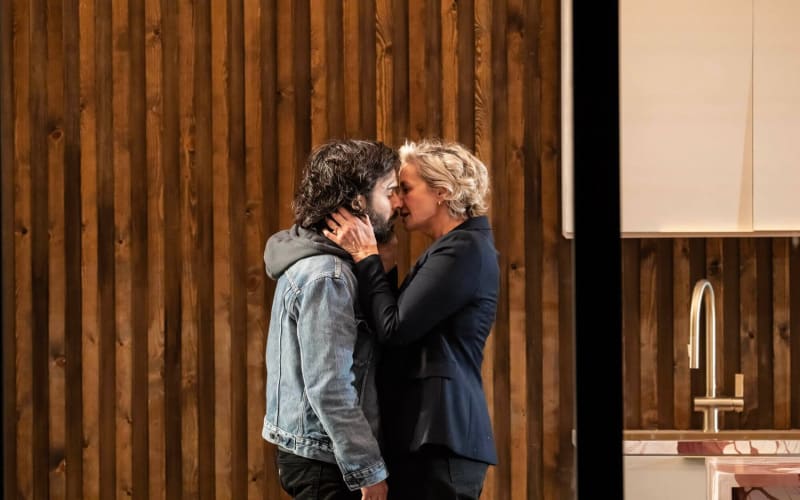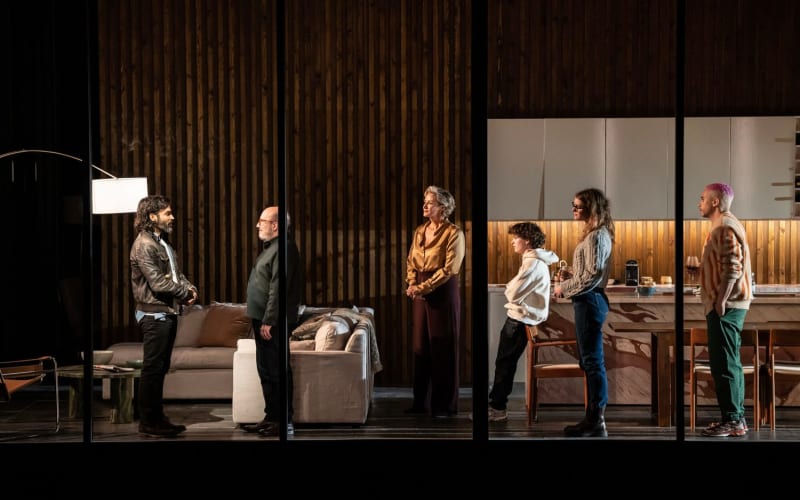During Rufus Norris’s tenure at the National, the classics have tended to be under-represented. Even when something does appear such as The Rivals, ostensibly by Sheridan, or this Phaedra, with its Greek antecedents, viewers find themselves watching a new play, loosely based on the classic.
That is not to detract from this compelling tragedy, written and directed by Simon Stone very much in the vein of his sensational reimagining of Yerma, which, while a good distance from Lorca’s original, was nevertheless intoxicating. Like that production, his vision is very much the Australian auteur’s own and again is played out within the confines of a claustrophobic Perspex box, this one set on a revolve.
The play opens to a scene of noisily happy families, featuring a group of high-achieving intellectuals delighting in talking over, winding up and striking sparks off each other. While Paul Chahidi’s meek, Iranian-born ambassador, Hugo, should be the patriarch, this is the kind of matriarchal family in which his wife Helen, a shadow minister portrayed with chilling accuracy by Janet McTeer, wears the trousers.
A generation down, daughter Isolde, played by Canadian screen favourite Mackenzie Davis, may be highly strung but dominates John Macmillan as weak, pink-haired Eric. Giving as good as he gets in the mayhem is teenage Declan, played with great promise by Archie Barnes.
As with any good Greek tragedy, the past informs the present, which inevitably replicates it or, as a long dead man says in an audio legacy to his son, “the vicious cycle continues”.
Everything is apparently going swimmingly until the arrival of an unexpected bearded, hippyish visitor from Morocco. Assaad Bouab plays dissident Sofiane, genial and polite at a the surface level but more explosive and destructive than your average suicide bomber. As we discover, he is the son of Helen’s former lover, which should be enough to tell anyone familiar with the original where the story is heading for the next couple of hours.
The world is turned upside down for everyone involved, as seductive Sofiane empties every family cupboard of skeletons, turning all against the other as tension ramps up to unbearable levels.
Designer Chloe Lamford really comes into her own in scenes where the characters symbolically find themselves wading through waist-high fields in various combinations going nowhere. There is comedy to leaven the darkness, most notably in the birthday party from hell that leads to a spectacular pitched battle.
Simon Stone’s modern tragedy in short scenes is every bit as meaningful and painful as any of the original sources, with the personal and political eventually overlapping.
This new Phaedra will be remembered for an outstanding performance by Janet McTeer, who seemingly reaches her peak in a series of verbal battles but then moves into full-scale Lear gear with an agonised war of loss.
That is not to take anything away from the superb supporting cast, with everyone named having their moments in the limelight, along with Akiya Henry in the role of Helen’s long-suffering sounding board and colleague and multilingual Sirine Saba as Sofiane’s equally long-suffering wife.
Some might justifiably question why this new play takes a familiar title rather than using some kind of mildly adapted alternative. Regardless of its name, this is a powerful and memorable piece that will leave viewers shaken to the core.


